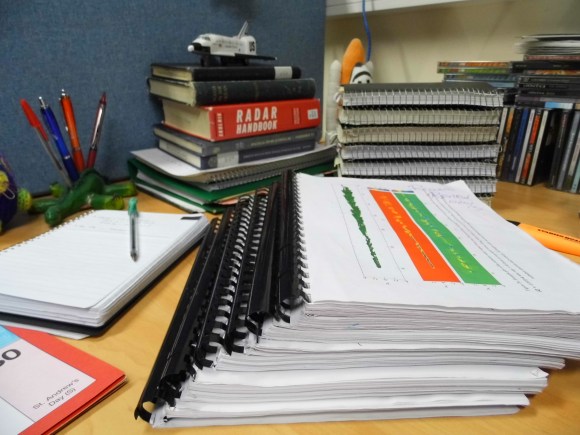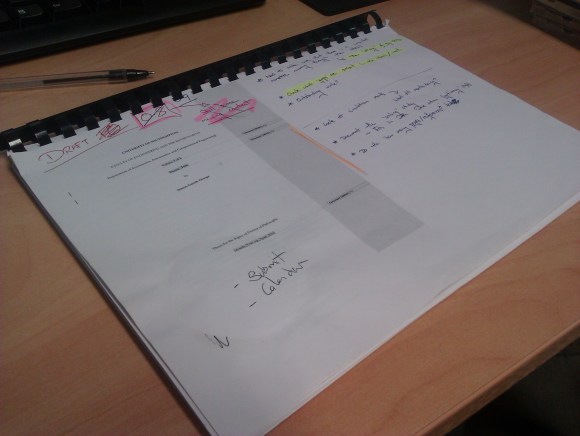
Well, it’s handed in. It’s all done. I am done.
Four years of work has finally culminated in 261 pages of words, numbers and pictures. At 2:39 pm today, I finally handed in my soft-bound copy of The Thesis for immediate review and examination. It’s all done for me now until the PhD viva; I’m not sure exactly what I’m going to fill my time with (other than worrying like hell about the viva), so perhaps it’s time to reflect on what I’m achieved in the last four (and a bit) years. Wow.

261 pages, 74173 words, 28 tables, 70 figures, 41 equations, 414691 characters (no spaces), 486444 characters (with spaces), 33 footnotes.
Because there wasn’t enough room on my ‘Acknowledgements‘ page to cover everything and everyone that has given me inspiration over the last four years, this post represents an extension of that page to make sure everyone is thanked for their endless help. If I’ve still forgotten you or something else dear to me, then let me know and I’ll fix it. But without further ado, let us commence:
![]()
(EXTENDED) ACKNOWLEDGEMENTS
The process of research is often a complex, syrupy substance and without the frequent, helpful advice and guidance of my friends and colleagues, I would most likely still be stuck somewhere in the fog.
Gratitude must first go to my supervisors Dr. Adrian Tatnall and Dr. Gary Coleman (now at NASA Langley Research Center), along with those who became prolific advisors on many aspects of my work: the guidance offered by my generous colleagues was more than I could hope for, providing both stimulating academic discussion and constant reassurance that, although the journey would be difficult, the destination would be reached in the end. Other academics who aided in soothing the worries and focusing the research were Dr. Watchapon Rojanaratanangkule, Dr. Glyn Thomas and Dr. Hugh Lewis. I must also thank the assistance of Prof Roland Romeiser (University of Miami) and Prof. Vladimir Kudryavtsev (Nansen International Environmental and Remote Sensing Center, St. Petersburg) for permitting use of their numerical codes for ocean radar image modelling (M4S and RIM, respectively) and invaluable guidance to my seemingly endless, undoubtedly short-sighted, queries.
Of course, my fellow students in the Astronautics Research Group also provided exciting and entertaining discussions both about research and the world at large, such as Ben Schwarz, Adam White, Rhys Clements, Dan Greenhalgh, Angelo Grubišić, Warinthorn Kiadtikornthaweeyot, Jaye Foster, Rich Blake, Zhe (Jeff) Zhang, Marcello Remedia, Francesca Letizia, Stefania Soldini, Stefano Redi, etc. I wish everyone all the best; for both those who’ve finished their postgraduate journey (“we made it!”) and those who’re still marching on (“keep going!”). You all deserve immense respect for putting up not only with the harsh, unpredictable Building 13 temperature climate, my leaky headphones, but also my noisy drawer-rummaging for the best part of four years; you have the patience(s) of saint(s). Also, I should also congratulate the vending machine on Level 2 of Bldg. 13 as it has proved a reliable ally in delivering sugary and/or caffeinated goodness to me when I really needed it. Vending machine, you’re the best.

The Theatre of Dreams.
They say music soothes even the savage beast, and for that the friendly Southampton RockSoc crew deserves recognition for their constant encouraging support and wise words throughout the course of my research. Here’s a (rather extensive) list of some of the RockSoc champs who have kept me on the straight ‘n’ narrow and whispered encouraging words in the last four years: Dave Joce(*), Jenny Josephs(*), Dan Illingworth, Ant James, Kim Lipscombe, Kate Thackeray, Timmy Peters, Louise Roberts, Pete Boorman, Andrew Day, Bob Rimington(*), Charlie Hargood(*), Adam Sobey(*), Angela Tack, Kirsty Mills, Lexi Elliott, Steve Bailey, Sina Simangooei(*), Al Frazer(*), Shez Parry, Pat McSweeney, Mikey Federanko, Sam Lander(*), Trim McKenna, Gord (just ‘Gord’), Louisa Wronska(*), Mike Williamson(*), along with many others I’ve inevitably forgotten; (*) also representing survivors (or current footsoldiers) of the PhD machine. There are still more Southampton people who must be recognised (but perhaps don’t fit under the ‘RockSoc’ banner): Laura and Dave; Claire/Sarah/Alice/Chloe/etc.; and many more.
Cap-doffing must also go to the raft of bands whose music maintained my focus and drive during my studies, notably AFI, Daft Punk, Rush, Nine Inch Nails, Less Than Jake, Foo Fighters, Turisas, The Ataris, Jimmy Eat World, Andrew WK, Ke$ha, Chipzel, Anamanaguchi, Cave In, Karnivool, Faith No More, Queens of the Stone Age, Justice, The Men That Will Not Be Blamed For Nothing, Biffy Clyro, [spunge], Iron Maiden, Sonata Arctica, Blaqk Audio, Weezer, Tool, Alkaline Trio, Owl City, Rhapsody of Fire/Rhapsody/Luca Turilli’s Rhapsody, Ensiferum, Dream Theater, The Smashing Pumpkins, Power Quest, Funeral For A Friend, Bad Religion, NOFX, The XX, Deadmau5, Owl City, Soundgarden, Diablo Swing Orchestra, Skindred, Knife Party, How To Destroy Angels, 2:54, Týr, The Explosion, Rival Schools, Gregory and the Hawk, Metallica, Cradle of Filth, Stratovarius, KT Tunstall, Thrice and a whole ton more. You guys rock, don’t ever stop.

Three soft-bound copies of The Thesis. Boom.
Old friends never die, and as such there’s a whole raft of Herefordshire inmates (and escapees) who’ve kept me afloat through these long few years with exciting distractions or wise words, and encouraged me to blow the Horn of Gondor in academia: Jeremy Gadfield for constant encouragement (“KEEP PU$HING”) Oliver Kibblewhite, Ananda Hill, Steph Dutson, Stacey Gibson, Laura Derry-Jones, John Sampson, Dave Grist, , Rachel England, Emma Hillier, Ed Locock; you know who you are, and you’re all awesome. My family also deserve immense recognition for their continued support and encouragement, and for being a rock of normality in my whirlwind research career whilst keeping me furnished with clean socks and stocks of home-made lemon curd (not to mention finance). As an aside, my faithful steed Big Suze should also be commended for being possibly the only reliable(ish) French car in history, and for letting me gad about the country in my time off to visit family and friends. THANK YOU BIG SUZE.
Lastly but by no means leastly, I must thank my dedicated partner, Bryony, for her constant support through all the stresses, struggles and stickiness, and for always believing in me.

Just a selection of the notebooks and draft versions of The Thesis that I’ve eaten through in the last 4+ years.
![]()
I briefly wondered what I would do once I submitted, and whether I would continue to post entries under the ‘PhD Fraud’ banner: I figured that, YES, for the time being, I shall continue. For a start, I’m not out of the woods yet (I still have to get through my viva before I can truly shake off the “PhD Fraud” title I have placed upon myself), but I also still feel that there are some legs in the series; at least as long as I continue to stay in academia/research and can still (potentially) offer some guidance/support/kindred misery with other PhD Frauds and Survivors across the globe. The story of my PhD struggles may soon be over, but there are still some lessons that can be learned from them, and which I am happy to impart.
Anyway, as a point of celebration, I made a couple of November Spotify playlists which boosted me through the harsh, unforgiving ‘formatting’ process. You can find them here: 013/11a – The Illusion of Safety (grunge/alt rock); 013/11b – Drain the Blood (punk rock).
[Zinar7]



























